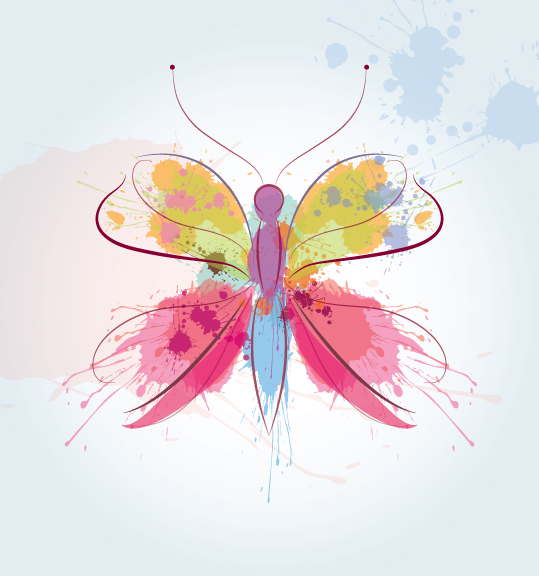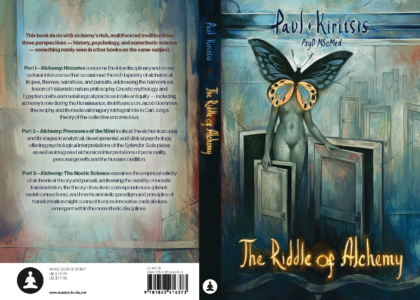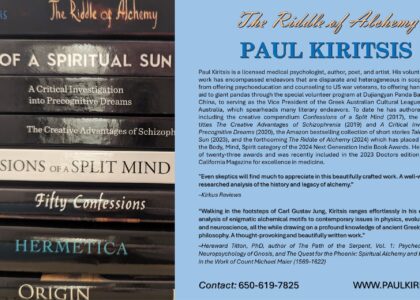
Dr. Paul Kiritsis presents the entry for the shared first place prize of the “Transpersonal Psychology” competition written by Bret Warshawsky.
The Hero’s Journey: Transforming Mental Illness into a Blessing
Fall of 1994: I am nineteen and in my first semester of film school in New York. Despite living with three good friends, I suddenly feel very much alone in the big city. All the women here are intimidating, spectacularly beautiful, like models. I can’t tell if they’re my age or thirty, and I certainly don’t dare ask them out. I’m feeling a little depressed about all this, but it’s nothing enormous or earth-shattering.
As Christmas approaches, I start having trouble sleeping. I’ve been reading Zen & The Art of Motorcycle Maintenance night and day, fascinated….obsessed. Living with fellow film students, and smoking a lot of pot, no one notices anything unusual when I start talking a lot and more and more rapidly, spending money like crazy and still not sleeping. Day 3…. Day 5… Day 6…. not sleeping. Writing furiously in notebooks. Unable to focus, I cut classes and roam the streets listening to Nirvana.
I am due to take a trip to Italy for the holidays, and after seven days without sleep, I show up at my parents’ house to get the plane tickets. The trip to New Jersey by bus is totally surreal. People’s faces look strange. I spend the two-hour ride speaking with a rabbi about the Bible and listening to Led Zeppelin. The time passes unevenly, sometimes more quickly than I can account for. At other points I’m stuck on a bus to infinity. I get off on Route 9 and walk the mile to my childhood home. Stairway to Heaven plays in my headphones as I cross the highway thinking: “I will never die.”
*
When I show up at home, my parents’ reaction is strange. Why are they looking at me like that?
“You’re acting very strange,” my mom says. “Are you on drugs?” I protest, laughing, but then at midnight I wake my thirteen-year-old sister and break down crying and talking at her a hundred miles a minute. My emotions feel way too intense, and I can tell I’m scaring her, but I can’t stop. When I tell my parents, “Nothing can hurt me, did you know that? I could walk out into traffic right now and not be hit. Not a scratch, I’m telling you,” my dad says, “We’re taking you to the hospital.” I agree to it; I don’t know why.
When we get to the hospital, I am separated from my parents and taken to a small white room, empty but for a video camera and two chairs, adjacent to the nurses’ station. The nurse tells me, “Wait right here—a social worker will be in to talk with you in two minutes.” And then she closes the door, and I wait. The two minutes go by and nobody comes. I feel totally agitated, wired and panicked, so I get up to leave the room. “Wait—it’s been locked! I’m trapped.”
I start screaming, “Mom! Dad! Help me! They locked me in here!” I know they’re sitting right there, but I can’t see or talk to them. This is terrifying. Instead of someone coming in right away to hold my hand, say, “Hey, Bret, what’s wrong?” and listen to me, they leave me alone in the room for half an hour. I start going crazy, hurling myself against the door, banging the walls with my fists, screaming and giving the video camera the finger. I am helpless!
When the doors open, help has not arrived. They have nothing to say. Instead, they lead me into the hall and stick a needle in my arm.
The pain is terrible, and instantly, I go into convulsions. “I’m dying!” I panic. “They’re killing me! They’re actually killing me right in front of my parents!* “Mommy, Mommy!” I scream, “Help me, I’m dying!” I feel like a helpless little child. The nurse quickly administers another shot, and I go limp as quickly as I went into convulsions—peaceful, sure this will be the end. But it is an antidote, and the convulsions stop immediately. I look at my parents’ ashen faces. My mother is staring at me. Her eyes are bewildered.
“He is psychotic and possibly a danger to himself and others,” the doctors tell my parents. I am admitted to the psych ward against my will and placed in a sterile white room with nothing in it but a chest of drawers and two single beds. I am in shock. “What is happening to me? How can they just take my freedom away?* I punch closed fists into the walls until they’re black and blue, screaming, “Let me out of here! Why am I here? What are you doing to me?” My fear is primal and total. I cry like I have never cried before.
The doctors in the psych ward spend two weeks bringing me down from what they call “a severe manic or psychotic episode,” though no one thinks to ask me what is going on. I am so confused—I swallow many different pills, and attend group therapy morning, noon and night. I don’t know what my real thoughts are anymore, and the overall atmosphere is simply bizarre. I hardly see my parents, and when they do come, they don’t know how to treat me. The place is populated by frightening, intense people, all of whom seem completely lost to themselves.
The doctors decide that the next step is to send me to an inpatient clinic in Princeton: “So I am still to be imprisoned.” I ride there in an ambulance, and when we arrive, my parents meet with more doctors while I sit in the lobby, crushing my glasses to pieces against the tile floor and repeating, “I’m tired of seeing.” My emotions are on total overload. One moment, I feel I’ve seen the light of the world. The next, I’m terrified I’ll be sucked into some vacuum of nothingness. I can’t take it anymore. When my parents come out, they announce: “The doctor thinks you’re bipolar.”
“We’re admitting you to the inpatient wing for treatment.” That’s when I hear, for the first time, that I have a mental illness.
*
I feel complete bewilderment. And shame. Because of my now two week-old comments about walking out into traffic, I am placed in the clinic’s suicide ward, in a room with white brick walls. As a fan of the bands Pink Floyd and Nirvana, I have to laugh as I cry: “Oh my God—here’s “The Wall” and they put me on “Lithium.” All day long I hear the incessant click of the air filter in the smoking room and the rhythmic beat of ping-pong balls in the recreation room. “Why would they put someone who’s sensitive to sound and slightly paranoid between these two awful, clashing sounds?”
But I also find a saving grace: my roommate, Aaron. A Princeton student, he has just gone through a very similar experience to my own, and we share the absurdity of it all as we try to cope. He has kind eyes, and a reassuring voice. My parents bring me a stack of books, including Whitman’s Leaves of Grass. Aaron reads me passages from it in our room. I’ve never had a guy read me poetry before—it is intimate and caring in a way I’m not used to. I think we both save each other, during our first weeks in the clinic.
When I left the clinic six weeks later, I dragged a new and heavy self. My self-confidence, self-worth and self-esteem were totally destroyed; and it was the first time I had ever experienced the devastation of the partner to severe mania—bipolar depression.
For the next ten years I was in and out of the psych ward six times; dosed with a variety of meds; deeply depressed; and addicted to marijuana, which brought on manic episodes every time. I lost the love of my life during one of these episodes—I told her, “I never loved you.” It wasn’t true, but I couldn’t take it back. Regret and unrequited love plunged me further into depression, and drug abuse—I smoked more pot to deal with the emotional and psychic pain. It was a vicious cycle, true insanity; smoking pot over and over again and expecting different results, only to end up in the psych ward again and again.
I was able to finally turn it around at twenty-nine, when I got sick and tired of being sick and tired—sick of depression, not having friends, being in the hospital all the time. One day I thought: “You have to quit smoking pot. And you have to take your meds. Do it for a year, and then re-evaluate.”
It was the right leap of faith. Things slowly got clearer. I could be better; I could still follow my dreams. I started feeling excited about life. I’d been through it all in psych wards, and in all these programs that basically warehouse people. But when you’re young, you don’t want to talk about your illness, even though that’s usually when you’re diagnosed. You don’t want to get help. It’s a terrible irony. When a friend told me about a program of study in psychosocial rehabilitation, I wanted to be part of a new way of treating mental illness, to be part of a proactive, compassionate care I didn’t get when I needed it most.
I would have loved to have someone like me talk to me when I was twenty.
I realized that helping others was a path to helping myself. Revisiting Joseph Campbell, I realized that the hero’s journey he describes was my journey; my odyssey down the rabbit hole of mental illness was like some postmodern suburban vision-quest filled with magic, mysticism and initiation. The hero’s return is in self-mastery, which is ultimately the freedom to live neither anticipating the future nor regretting the past. Looking at myself through a mythic lens, I realized slowly but definitively: “Experiencing a mental illness does not mean being an illness. It is not eternal punishment, but a blessing in disguise. I’m a survivor.”
*
That disguise is no more!
1. Is the world ready to understand and accept that bipolar is not an illness, disease or disorder?
2. What would happen if we labelled and categorized bipolar as a consistent state of extreme states of being?
3. How do we serve people that are experiencing these extreme states of being?
4. Why should we transform our beliefs and forego the illness models and create a model based on my belief that bipolar is better suited to being recognized as a consistent state of extreme states of being?
We change the names to change the game!
There is a saying: “The map is not the territory.”








